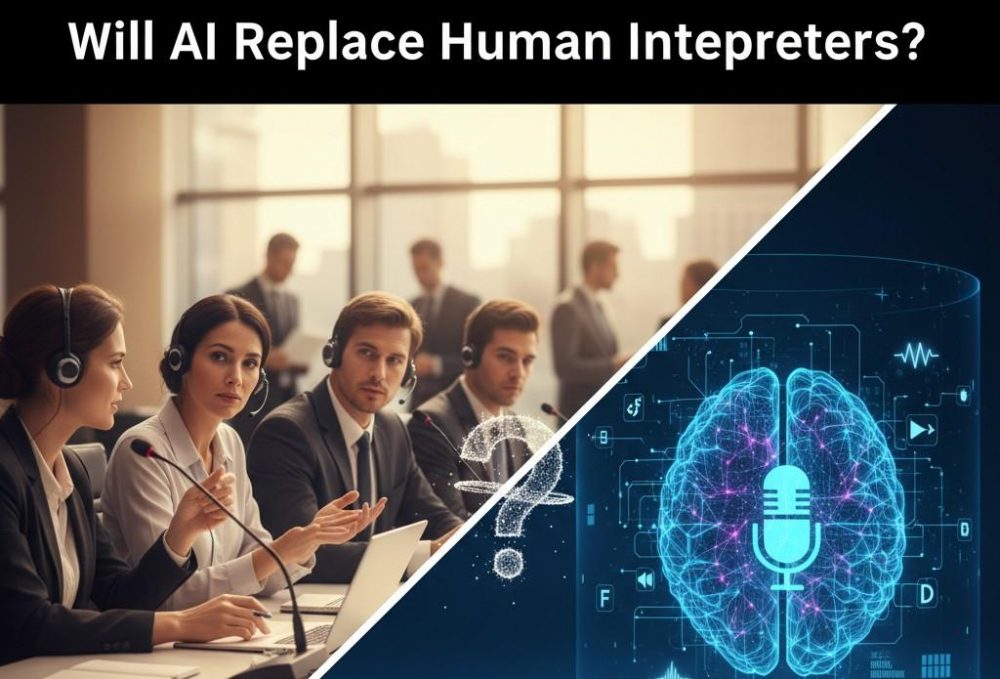The world of language and interpretation has gained a whole new dimension over the last few years due to AI and Machine Learning. Google Translate, along with several other high-end tools, now can provide much better and quicker translations. The technology has reached the extent when ordinary people can also understand the meaning of any language easily and instantly.
With this fast evolution of technology, one question that comes to mind is whether these advanced tools can really beat human expertise. AI is quite impressive in translating basic sentences and words. However, when deeper communication, cultural understanding, and human emotions come into play, the picture tends to be different.
1.The Importance of “Human Interpreters” Even Now
Even today, for serious matters such as court, hospital, or a business meeting, people always fall back upon human interpreters. The main reason for this is due to human intelligence and flexibility. AI works on data and algorithms only.
Human interpreters convey meanings by considering not just the words, but also the tone of voice, body language, and the whole setting in which the utterances are made. These are features that machine translation hasn’t yet captured, which is why for communications where there’s no room for error, human interpreters are the best choice.
2.Difference Between Context and Nuance
Language is not just a set of words, but it’s related to context and setting. The meaning of one word or phrase differs in different environments; this can be termed context. AI translation tools often miss the right context.
Whereas a human interpreter knows in what context which words are best used and which have other meanings in a different culture, that nuance is what makes human communication so unique, and it is the ultimate strength of human interpreters.
3.AI’s Speed, the Depth of Human Emotions
AI’s biggest strength is speed. It can translate thousands of words in seconds. But human emotions and empathy are beyond the reach of AI. If a patient needs to be given bad news, or a peacemaking process is needed between two countries, simply translating words is not enough.
This is where human interpreters are required to portray the depth and seriousness of the conversation through their tone and emotions to the other party. In such delicate moments, only human humor and responsibility can make communication successful.
4.The Need for Humans in Specialized Fields
Most of the fields where it’s really difficult for AI to translate are, for instance, medical or legal translations. In these cases, the jargon and technical expressions are very important and specific.
A small mistake in translation can endanger a patient’s life in the medical field. Similarly, a single incorrect translation of any document can change the entire case in court. For this reason, these specialized fields will always maintain a need for Human Interpreters with deep understanding and expertise of the field.
5.The Issue of Ethics and Confidentiality
The work of an interpreter in most instances is deeply connected with confidentiality and ethics. A professional human interpreter always upholds principles of confidentiality. They know when and to what extent they should speak.
Although AI systems and online tools store your data, this may pose a threat to confidentiality. Most companies and government organizations will always trust human interpreters with their confidential data since they provide better confidentiality guarantees.
6.Hybrid Model: Humans and Technology Together
Eventually, AI will not fully displace human interpreters but rather complement them. We’re moving into a ‘Hybrid Model’ in which machine translation will serve as the basic translation of the first draft.
This will help human interpreters save much time for more constructive purposes, focusing on developing better accuracy of the content, context, and other cultural aspects. This cooperation will bring together human expertise with the velocity of AI for better communication.
7. How AI Helps Human Interpreters
But AI tools, like Terminology Management Systems-which manage the spelling of words-and Computer-Assisted Translation, or CAT, tools make the human interpreter’s job easier. These are used and memorize technical terms quite often. With this, human interpreters will not have to translate the same words every time. This not only saves their time but also cuts down on mistakes. While AI therefore competes with human expertise, it also enhances the power of human expertise.
8. Planning for the Future
With time, the only human interpreters who will be successful will be those who learn to embrace technology and work with it. In addition to translation, they will be valued for their specialization and ability to make the right decisions in difficult situations. AI is an opportunity for all of us to improve our skills and focus on things only humans can do: humor, understanding, and top-notch creativity.
Frequently Asked Questions
1. Is AI translation cheaper compared to human translation?
Yes, machine translation may be much cheaper than human translation. However, be aware that accuracy and quality may vary, especially in complex and delicate communications.
2. Can I use an AI translation tool in court?
Generally, no. Courts and medical settings always require certified and professional human interpreters to ensure translation errors and adherence to legal principles.
3. What is the most challenging part of “language and interpretation”?
It is conveying the right context and tone, which cannot be done effectively by any machine. Therefore, humans play a very significant role here.
4. What are CAT Tools?
CAT Tools, or Computer-Assisted Translation Tools, are a group of software tools that support human interpreters. They accelerate translation processes and memorize often-used words and expressions to keep consistency.
5. Will AI eliminate the jobs of human interpreters?
No, the jobs will not disappear but change their form. Interpreters will now have to concentrate on technical and specialized translation, and will use AI to support them in their work.



